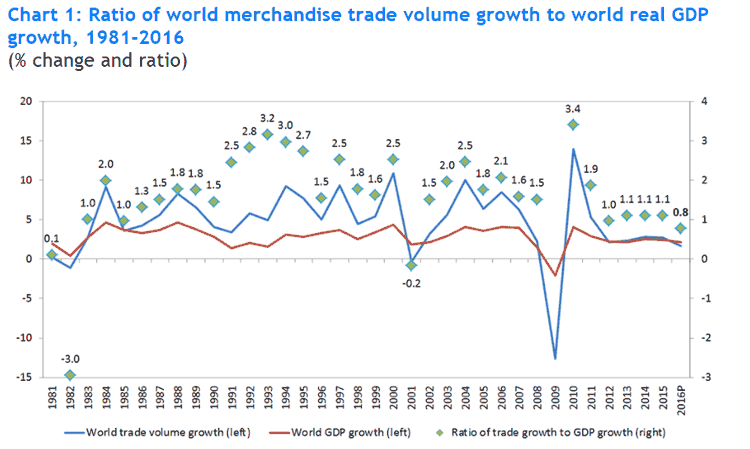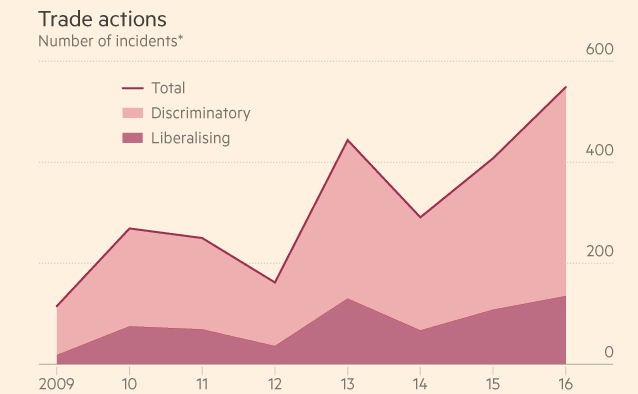The world seems to be at something of an inflection point when it comes to global trade.
As SCDigest has been regularly reporting, trade volumes have been in sharp decline in recent years . For example, just a few weeks ago the World Trade Organization downgraded its earlier forecast for 2016 global trade growth from 2.8% in April to just 1.7%. The 2017 forecast was similarly downgraded to a lower bound of 1.8% growth from a previous forecast of 3.6%.
Supply Chain Digest Says... |
 |
| US Steel argued that the cyber attacks did not just benefit Baosteel but China's entire steel industry, saying it was an act of state-sponsored theft that justified a ban on all imports of Chinese steel to the US. |
 |
What do you say? |
| Click here to send us your comments |
 |
| Click here to see reader feedback |
|
|
What more, as shown in the chart below, world trade growth is expected to fall below global GDP growth for one of the few times in recent history. Before 2016, this scenario has only been seen in the recession years of 2009, 2002, and 1981-82. That means the ratio of world trade growth to GDP growth, generally over 1.5 since at least the early 1990s, has now expected to be just 0.8 here in 2016.
What are the factors behind this change? There are many, most notably an overall weak global economy, plus low commodity prices, regional manufacturing strategies by multi-national corporations, and some level of increased protectionism.
Just how big is the impact of protectionist moves by various countries across the globe? It's hard to say, but the data suggest the number of protectionist actions is far surpassing the level of country moves that liberalize trade.
The Financial Times recently reported that according to data compiled by research firm Global Trade Alert, governments took more than 500 discriminatory actions against foreign competitors between January and August. Such measures are also being put into effect faster. Compared with the same period in 2009, four times as many protectionist measures were introduced.
By comparison, as shown in the chart below, through August there have been only about 100 trade liberalization moves.
The Financial Times also noted that how much of an effect recent increases in protectionism are having on the global economy remains a subject of debate. Just a few weeks, ago, IMF economists attributed only a small portion of the slowdown in global trade to protectionism.

Source: World Trade Organization
However, Maurice Obstfeld, the IMF's chief economist, argues that efforts by governments to protect industries from outside competition driven by the 2008 crisis have become significant for the global economy.
Number of Protectionist Trade Actions Globally Up Shaply So Far in 2016

Source: Financial Times
He told the Times that "[The trend] is very symptomatic of the low-growth environment that we are in," he says. "The pie is smaller and so countries chip away at certain sectors."
It is worth noting that most of the protectionist moves in recent years have been focused on just a few industry sectors, especially metals. Since 2008, G20 countries alone have introduced almost 820 measures affecting the trade in metals such as steel, copper and aluminum.
Many countries blame China for the glut of metals such as steel that has caused prices to collapse. In the US that has led to anti-dumping cases that have seen tariffs of as much as 500% imposed on some types of Chinese steel. In Europe, the steel industry's woes have fueled opposition to EU plans to designate China a market economy, as Beijing claims it should do later this year under the terms of its 2001 entry to the WTO.
(See More Below)
|
CATEGORY SPONSOR: SOFTEON |
|
|
| |
|
|
Ground Breaking US Steel Case
Within the metals sector, there is an interesting and perhaps ground breaking suit by US Steel alleging digital theft of its trade secrets.
US Steel alleges that February 2010, an email disguised as being from US Steel's chief executive was received by some two dozen company employees. Within weeks, "UglyGorilla", a Chinese hacker, had allegedly broken into at least 1,700 of the company's computers and mobile devices.
It gets worse.
US Steel claims that about one year later, more Chinese hackers using similar methods targeted the computer of a researcher at the company. Within days, US Steel claims, the hackers had stolen secret files containing details of how to produce types of ultra-high-strength steel used in the automotive industry.
Then less than two years later, US Steel alleges that China's Baosteel was producing its own products that had the same qualities, having overcome a technical barrier using techniques that US Steel took more than ten years to develop.
In a complaint this spring, US Steel argued that the cyber attacks did not just benefit Baosteel but China's entire steel industry, saying it was an act of state-sponsored theft that justified a ban on all imports of Chinese steel to the US.
Should the the United States International Trade Commission find in favor of US Steel, experts say it will be the first time an alleged state-backed hacking attack has resulted in one country imposing trade sanctions on another.
The US Steel case was filed under a section of the Tariff Act of 1930, which allows the banning of imports linked to stolen intellectual property. But the link to alleged cyber theft illustrates how the rapid rise of digital technology is creating triggers for trade disputes - often because there is no established international law on hacking, encryption and other areas.
For its part, China's says the US Steel legal action is just American protectionism. Li Xinchuang, vice secretary-general of the China Iron & Steel Association, has said the case is "without merit" and a sign of US decline.
"They are lagging us and yet they hope to limit us through protectionism," he says. "They are ahead in technology industries. So why use protectionism to help a sunset industry?"
Where is this all going? It's hard to say, and in the end elections do matter, whether that is the Brexit vote calling for the UK to leave the EU, or the upcoming US presidential race, in which Donald Trump based much of his campaigning on correcting what he says are unfair trade deals, and his opponent Hillary Clinton who said in August she would not support the major Trans Pacific Partnership trade pact being pushed by the Obama administration - though many believe she will reverse that stance if she wins the election.
What are your thoughts on global trade? Is protectionism rising - and is that good or bad? What about the US Steel case? Let us know your thoughts at the Feedback section below.
Your Comments/Feedback
|